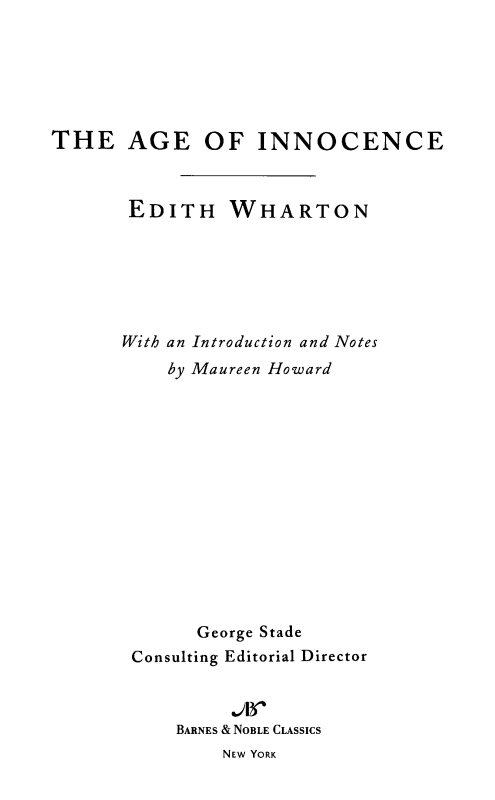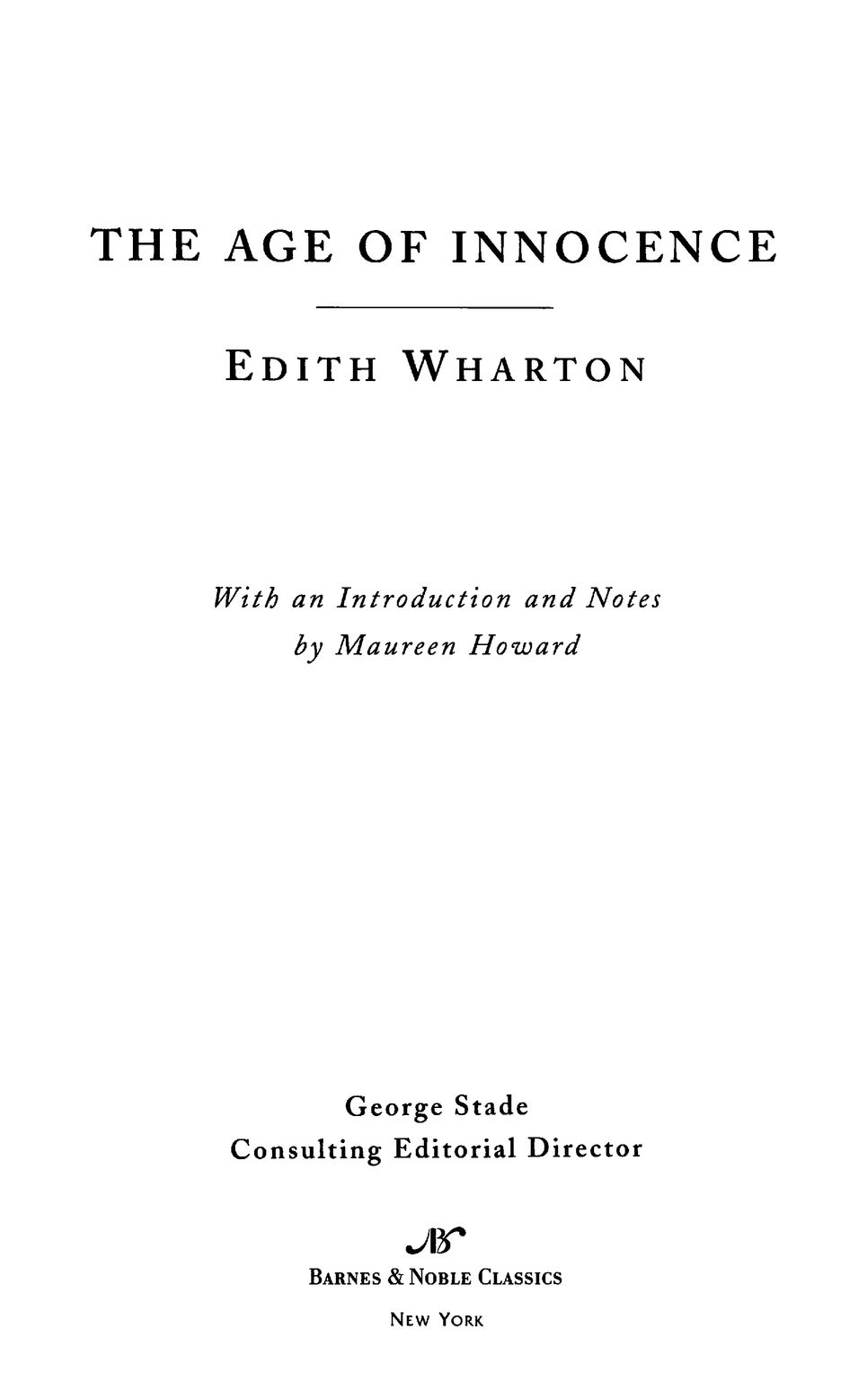Age of Innocence (Barnes & Noble Classics Series)
Read Age of Innocence (Barnes & Noble Classics Series) Online
Authors: Edith Wharton

BOOK: Age of Innocence (Barnes & Noble Classics Series)
2.09Mb size Format: txt, pdf, ePub

Table of Contents
FROM THE PAGES OF
THE AGE OF INNOCENCE
THE AGE OF INNOCENCE

Few things seemed to Newland Archer more awful than an offense against “Taste,” that far-off divinity of whom “Form” was the mere visible representative and vicegerent.
(page 14)
The persons of their world lived in an atmosphere of faint implications and pale delicacies, and the fact that he and she understood each other without a word seemed to the young man to bring them nearer than any explanation would have done.
(page 16)
“If we don’t all stand together, there’ll be no such thing as Society left.”
(page 43)
He always came away with the feeling that if his world was small, so was theirs, and that the only way to enlarge either was to reach a stage of manners where they would naturally merge.
(page 86)
“I want to be free; I want to wipe out all the past.”
(page 90)
“I felt there was no one as kind as you; no one who gave me reasons that I understood for doing what at first seemed so hard and—unnecessary. The very good people didn’t convince me; I felt they’d never been tempted. But you knew; you understood; you had felt the world outside tugging at one with all its golden hands—and yet you hated the things it asks of one; you hated happiness bought by disloyalty and cruelty and indifference. That was what I’d never known before—and it’s better than anything I’ve known.”
(page 141)
“It’s worth everything, isn’t it, to keep one’s intellectual liberty, not to enslave one’s powers of appreciation, one’s critical independence?”
(page 164)
His whole future seemed suddenly to be unrolled before him; and passing down its endless emptiness he saw the dwindling figure of a man to whom nothing was ever to happen.
(page 185)
In the rotation of crops there was a recognized season for wild oats; but they were not to be sown more than once.
(page 249)
It was the old New York way, of taking life “without effusion of blood”; the way of people who dreaded scandal more than disease, who placed decency above courage, and who considered that nothing was more ill-bred than “scenes,” except the behavior of those who gave rise to them.
(page 272)
The worst of doing one’s duty was that it apparently unfitted one for doing anything else.
(pages 284-285)
He had to deal all at once with the packed regrets and stifled memories of an inarticulate lifetime.
(page 289)


Published by Barnes & Noble Books
122 Fifth Avenue
New York, NY 10011
122 Fifth Avenue
New York, NY 10011
The Age of Innocence
was first published in 1920.
was first published in 1920.
Published in 2004 by Barnes & Noble Classics with new Introduction,
Notes, Biography, Inspired By, Comments & Questions,
and For Further Reading.
Notes, Biography, Inspired By, Comments & Questions,
and For Further Reading.
Introduction, Notes, and For Further Reading
Copyright @ 2004 by Maureen Howard.
Note on Edith Wharton, The World of Edith Wharton and
The Age of Innocence,
The Inspiration for
The Age of Innocence,
and Comments & Questions
Copyright @ 2004 by Barnes & Noble, Inc.
The Age of Innocence,
The Inspiration for
The Age of Innocence,
and Comments & Questions
Copyright @ 2004 by Barnes & Noble, Inc.
All rights reserved. No part of this publication may be reproduced or
transmitted in any form or by any means, electronic or mechanical,
including photocopy, recording, or any information storage and
retrieval system, without the prior written permission of the publisher.
transmitted in any form or by any means, electronic or mechanical,
including photocopy, recording, or any information storage and
retrieval system, without the prior written permission of the publisher.
Barnes & Noble Classics and the Barnes & Noble Classics
colophon are trademarks of Barnes & Noble, Inc.
colophon are trademarks of Barnes & Noble, Inc.
The Age of Innocence
ISBN-13: 978-1-59308-143-0 ISBN-10: 1-59308-143-X
eISBN : 978-1-411-43374-8
LC Control Number 2004102763
Produced and published in conjunction with:
Fine Creative Media, Inc.
322 Eighth Avenue
New York, NY 10001
Fine Creative Media, Inc.
322 Eighth Avenue
New York, NY 10001
Michael J. Fine, President and Publisher
Printed in the United States of America
QM
5 7 9 10 8 6
EDITH WHARTON

Edith Newbold Jones was born January 24, 1862, into such wealth and privilege that her family inspired the phrase “keeping up with the Joneses.” The youngest of three children, Edith spent her early years touring Europe with her parents and, upon the family’s return to the United States, enjoyed a privileged childhood in New York and Newport, Rhode Island. Edith’s creativity and talent soon became obvious: By the age of eighteen she had written a novella,
Fast and Loose
(as well as witty reviews of it) and published poetry in the
Atlantic Monthly.
Fast and Loose
(as well as witty reviews of it) and published poetry in the
Atlantic Monthly.
After a failed engagement, Edith married a wealthy sportsman, Edward Wharton. Despite similar backgrounds and a shared taste for travel, the marriage was not a success. Many of Wharton’s novels chronicle unhappy marriages, in which the demands of love and vocation often conflict with the expectations of society. Wharton’s first major novel,
The House of Mirth,
published in 1905, enjoyed considerable literary success.
Ethan Frome
appeared six years later, solidifying Wharton’s reputation as an important novelist. Often in the company of her close friend Henry James, Wharton mingled with some of the most famous writers and artists of the day, including F. Scott Fitzger ald, André Gide, Sinclair Lewis, Jean Cocteau, and Jack London.
The House of Mirth,
published in 1905, enjoyed considerable literary success.
Ethan Frome
appeared six years later, solidifying Wharton’s reputation as an important novelist. Often in the company of her close friend Henry James, Wharton mingled with some of the most famous writers and artists of the day, including F. Scott Fitzger ald, André Gide, Sinclair Lewis, Jean Cocteau, and Jack London.
In 1913 Edith divorced Edward. She lived mostly in France for the remainder of her life. When World War I broke out, she organized hostels for refugees, worked as a fund-raiser, and wrote for American publications from battlefield frontlines. She was awarded the French Legion of Honor for her courage and distinguished work.
The Age of Innocence,
a novel about New York in the 1870s, earned Wharton the Pulitzer Prize for fiction in 1921—the first time the award had been bestowed on a woman. Wharton traveled throughout Europe to encourage young authors. She also continued to write, lying in her bed every morning, as she had always done, dropping each newly penned page on the floor to be collected and arranged when she was finished. Wharton suffered a stroke and died on August 11, 1937. She is buried in the American Cemetery in Versailles, France.
a novel about New York in the 1870s, earned Wharton the Pulitzer Prize for fiction in 1921—the first time the award had been bestowed on a woman. Wharton traveled throughout Europe to encourage young authors. She also continued to write, lying in her bed every morning, as she had always done, dropping each newly penned page on the floor to be collected and arranged when she was finished. Wharton suffered a stroke and died on August 11, 1937. She is buried in the American Cemetery in Versailles, France.
THE WORLD OF EDITH WHARTON AND
THE AGE OF INNOCENCE
THE AGE OF INNOCENCE

Other books
Dominion by J. L. Bryan
Across The Hall by Facile, NM
Belladonna by Fiona Paul
Disappearing Staircase Mystery by Gertrude Chandler Warner
southern ghost hunters 01 - southern spirits by fox, angie
One Night Rodeo by Lorelei James
Dirty Neighbor (The Dirty Suburbs) by Miller,Cassie-Ann L.
Decked with Holly by Marni Bates
The Friends of Eddie Coyle by George V. Higgins